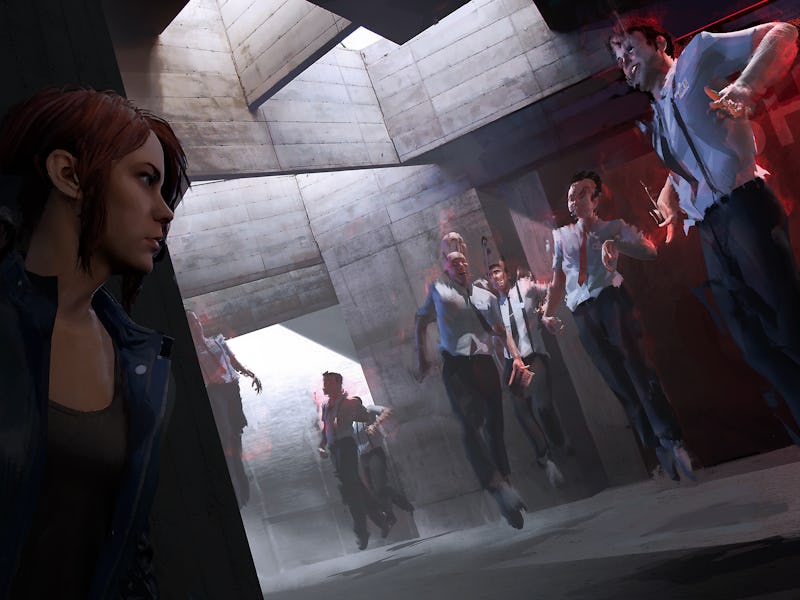How Control Changed Video Game Storytelling Forever
It’s all connected.

Remedy Entertainment stepped into the spotlight with Max Payne in 2001. The gritty action game brought The Matrix’s bullet-time into games and put lots of eyes on the developer. In 2010, Alan Wake gained Remedy a whole new crop of fans thanks to its moody atmosphere and intriguing thriller plot. A much more sedate experience than Max Payne, Alan Wake prized tension and survival-horror elements rather than slick action.
Then in 2019, Remedy found a way to merge the immaculate tone of Alan Wake with the wild action of Max Payne, and stuff it all into one ordinary-seeming office building. The result, Control, brought Remedy to a whole new stratum of success and set up one of the most exciting video game crossovers ever.
Control’s trippy visuals set the scene for its mind-bending story.
From its opening moments, it’s clear that Control is something special. As protagonist Jesse Faden warns you in her opening line, “This is gonna be weirder than usual.” Jesse is speaking to — someone. Or at least, something. Who or what it is won’t be revealed until much later, but for now we get a good sense of who Jesse is and what Control is going to be. Jesse is upset, she speaks about the superficiality of the world around her and her determination to break through to something more real.
Control gives her that chance. As Jesse’s opening narration plays out, we see a series of disjointed images. Interlocking geometric shapes revolve and contort around each other, a man puts a pistol to his head, a janitor slowly sweeps in a pitch-black room.
Once you actually start playing, Control becomes more orderly, but not necessarily easier to understand. You begin in a seemingly empty office building, where you’re free to wander around, reading memos to your heart’s content. As you make your way through its halls, you’ll hear more narration from Jesse, see more inscrutable cutscenes blending surreal images with actual filmed footage of scientists lackadaisically discussing paranormal events.
In structure, Control isn’t too different from other third-person shooters. You’ll make your way through the offices of the Federal Bureau of Control, also known as the Oldest House, finding keys along the way to open new areas. You’ll collect new weapons and upgrades to fight increasingly powerful enemies, punctuated now and then with a climactic boss fight.
It’s got plenty of action, but it’s more than just an action game.
What sets Control apart is its tone. Funny and dire all at once, Control takes place in the presence of people who study impossible events on a daily basis. It gets a lot of mileage out of that juxtaposition, both for humor and dramatic effect.
But another layer deep, it’s about a woman who’s had a break with consensus reality. Jesse has known since childhood that the world around her is an illusion, that the authority figures in her life have it all wrong, and that things no one is able or willing to discuss are happening all the time. It’s about Jesse’s fight not only to understand why she has this singular insight and what that means, but to prove that what she knows is real actually is.
As Jesse descends further into the Oldest House, the truth about her own history is revealed to her, and its strange dream logic seeps its way into the player, too. Of course the building’s janitor can be the most powerful entity within it and of course an ashtray can be the most terrifying object imaginable. Control opens the door to all sorts of paranormal truth, so in a way it’s not surprising when it starts bleeding into Remedy’s other games.
Toward the end of Control, you can start discovering references to the town of Bright Falls and to a particular person there named Alan Wake. As someone who’s experienced his own peek into what’s hiding behind reality, of course Alan Wake himself has caught the attention of the FBC.
Jesse’s story opens a world of possibilities for Remedy’s future games.
What could have just been a throwaway reference for fans later unfurled into a shared universe. As a DLC for Control reveals, Alan Wake may have actually set the events of the entire game into motion. For fans who’ve waited years for a proper Alan Wake sequel, Control was vindication arriving at last. The upcoming Alan Wake 2 will have some connections to Control, though Remedy isn’t saying yet how clear they’ll be.
To further complicate the whole twisty story, Control is getting a sequel of its own, which is even more mysterious than Alan Wake 2. So it seems that Jesse Faden’s journey into the Oldest House spawned a whole new series and brought an old one back from the dead — and those two series may be working together to tell one story.
Four years after its release, Control stands as one of the most inventive action games ever. That alone would make it worth celebrating, but it also represents one of the boldest shared universe experiments we’ve ever seen in gaming. Only time will tell how it pans out, but for now, we can bask in the enticing mystery of just how deep the rabbit hole of Control goes.
Control is available now on PlayStation, Xbox, Switch, and PC.
This article was originally published on